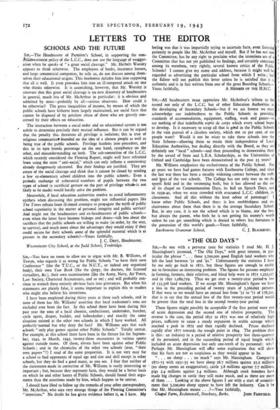headmasters must appreciate Mr. McArthur's tribute to the record not
only of the L.C.C. but of other Education Authorities in the developing of Secondary Schools—but if we are honest we must acknowledge our indebtedness to the Public Schools in providing standards of accommodation, equipment, staffing, work and games—to say nothing of that indefinable esprit de corps which every school hopes to develop. Is it necessary to scrap all that is good in the Public Schools in the vain pursuit of a classless society, which not to per cent, of our people want? Would it not be wiser to take these schools into the State Scheme—allowing them to retain their independence of Local Education Authorities, but dealing directly with the Board, as they are definitely not " local" schools—and then proceeding to democratise them by the award of State and L.E.A. Scholarships, as the Universities of Oxford and Cambridge have been democratised in the past 25 years?
Mr. Williams emphasises the exclusiveness of the Public School. For 40 years we have had games fixtures with Eastbourne College, and since the last war there has been a steadily widening contact between the staffs and toys of the two schools. The College has not only met us on the sports field and in the swimming bath, but it has allowed us the use of its chapel on Commemoration Days, its hall on Speech Days, and in 1939-40, when we were crowded with evacuated L.C.C. children, its classrooms. And all this without the least odour of patronage! I know other Public Schools, and thene is less snobbishness and ex- clusiveness about them than there is in the average Secondary School. But, in any case, it is not the school which is to blame, nor the boy. but always the parent, who feels he is not getting his money's worth unless he can get something which is denied to others less fortunate in the possession of this world's goods.—Yours faithfully,


























 Previous page
Previous page